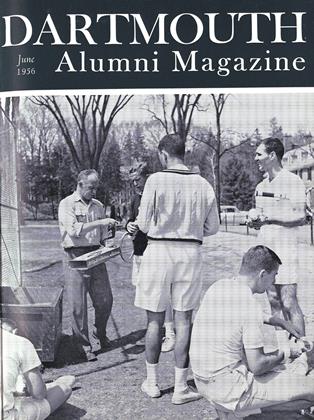THIS column brings to an end the twenty-third year of Hanover Browsing. I hope it has brought you a few worth-while suggestions. I hope a lot of new writers will, in the coming year, have a string of successful and good books for me to comment on: books written with charm, integrity, and taste. At any rate, here is something for June.
Two important books, which may be somehow linked together, are Kent Cooper's The Right To Know and Richard H. Rovere's The Eisenhower Years: both published by Farrar, Straus, and Cudahy.
Mr. Cooper, with sixty years of newspaper experience behind him, is convinced that mutual exchange of truthful news between all countries, completely free from governmental interference, will advance the cause of international understanding and cut down the chance of war. In this book he writes a clear exposition of the evils of government news suppression in peace time and political censorship in war time. The inference is that news is slanted and propaganda circulated, in other than Iron Curtain countries, though the totalitarian states have reduced suppression of truth to a science. "Everywhere," he writes, "Russia, England, France, Germany - the list goes on - the people yearn for peace. And everywhere numerically insignificant groups of individual opportunists who have gained political mastery of their nations plan threateningly to pick off loyal adherents each for their side." An important book.
Richard H. Rovere, entertaining and shrewd political writer for The NewYorker, has written a book of events and personalities of the Eisenhower administration. There are familiar portraits of Dulles, Adams, Nixon, as well as objective but devastating sketches of men like McCarthy. Mr. Rovere is not a campaign biographer and there are many illuminating barbs in his book. However, on the whole he is objective, easy to read, and will infuriate only the most rabid isolationist right-wingers. These will not care for they have never heard of Rovere.
There recently arrived in London, Father Trevor Huddleston, former head of the (Anglican) Community of the Resurrection's mission in Sophiatown, Johannesburg, to take up the post of novice-master of the community. He spent twelve years ministering to the blacks in South Africa. There, two million whites dominate thirteen million blacks for their own ends. Africans are condemned to lives which are crippled and distorted by frustration and the contempt of those who treat them not as humans but as a labor force. Father Huddleston does not mince words but makes a slashing attack in his recent book Naught For Your Comfort, now running serially in England, and published here by Doubleday. It would not surprise me if Dr. Schweitzer and Father Huddleston are the contemporaries who will long be remembered in Africa for their Christlike, unselfish work to bring some light into the lives of so many exploited people. This is a book which will shake anyone with a conscience.
Space forbids any lengthy comment, but for the reader who wants to know something about the Israeli side (I have previously written here of books about the Arabs) I can recommend to them Harry M. Orlinsky's Ancient Israel, and Social Forcesin the Middle East, edited by S. N. Fisher, of Ohio State. The first is a book full of wisdom about ancient Israel from whence came Christianity; the second is a book written by several hands, describing the hopes and fears of the people of the Middle East. Both are published by our friend Victor Reynolds of the Cornell University Press.
To the nature, or wilderness, lover I can strongly recommend Sigurd Olson's The Singing Wilderness, with black and white illustrations by Francis Lee Jaques. Mr. Olson is a famous woodsman but he is also a poet. Here he writes sensitively and often beautifully about the Quetico-Superior country of Minnesota and Ontario. Knopf is the publisher and the book fully measures up to their high standards of design and typography. Recommended.
A first novel worth reading (it is short) is A Man's World, a tale of love on the Riviera, written by a promising young man, Douglas Fairbairn. S & S published this.
Harold Nicholson's Good Behaviour is good fun.
Edmund Wilson's Red, Black, Blondand Olive (studies in four civilizations: Zuñi, Haiti, Soviet Russia and Israel) will keep you pleasantly busy for a long time.
 View Full Issue
View Full Issue
More From This Issue
-
 Feature
FeatureThe Reynold Scholars
June 1956 By PROF. JOHN HURD '21 -
 Feature
FeatureLEARN AMERICAN
June 1956 By EDWARD C. KIRKLAND '16 -
 Feature
FeatureA NEW CONCEPT of Dormitory Living
June 1956 -
 Feature
FeatureTHE NICHOLS ERA
June 1956 -
 Class Notes
Class Notes1918
June 1956 By ERNEST H. EARLEY, RICHARD A. HOLTON -
 Class Notes
Class Notes1926
June 1956 By HERBERT H. HARWOOD, ANDREW J. O'CONNOR
HERBERT F. WEST '22
-
 Article
ArticleHANOVER BROWSING
November 1935 By Herbert F. West '22 -
 Article
ArticleHanover Browsing
May 1948 By HERBERT F. WEST '22 -
 Article
ArticleHanover Browsing
June 1948 By HERBERT F. WEST '22 -
 Article
ArticleHanover Browsing
October 1952 By HERBERT F. WEST '22 -
 Article
ArticleHanover Browsing
November 1956 By HERBERT F. WEST '22 -
 Article
ArticleHanover Browsing
February 1951 By HERBERT F. WEST '22
Article
-
 Article
ArticleMooselauke from the South
February 1925 -
 Article
Article'24's PRE 25TH REUNION SPRING GET-TOGETHER
May 1948 -
 Article
ArticleA Wah Hoo Wah!
November 1956 -
 Article
ArticleRadio Production
MAY 1963 -
 Article
ArticleArabic and Hebrew added to curriculum
OCTOBER • 1986 -
 Article
ArticleDartmouth's Intellectual Life
MAY 1930 By Donald E. Cobleigh

